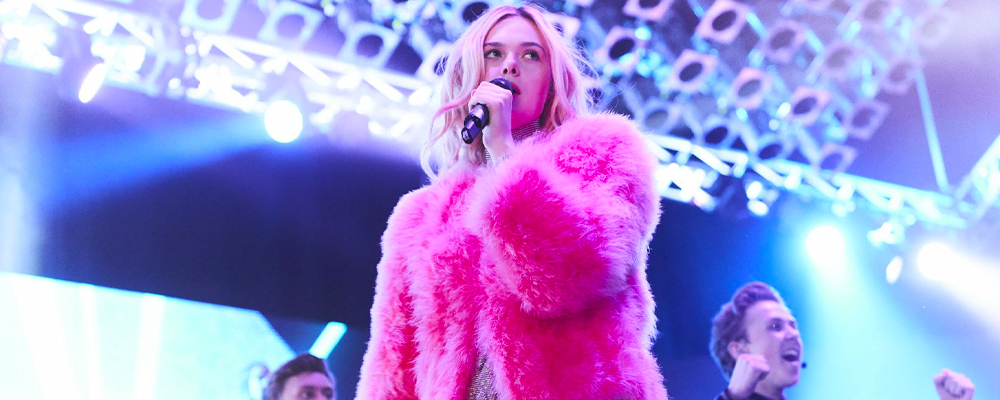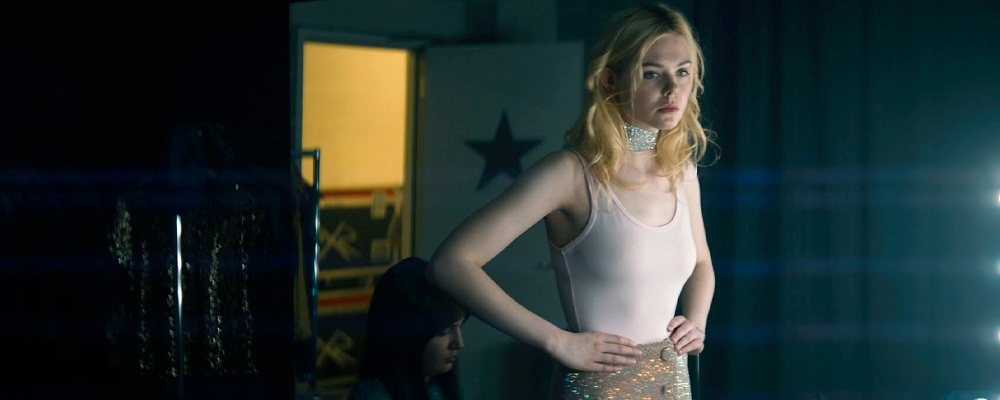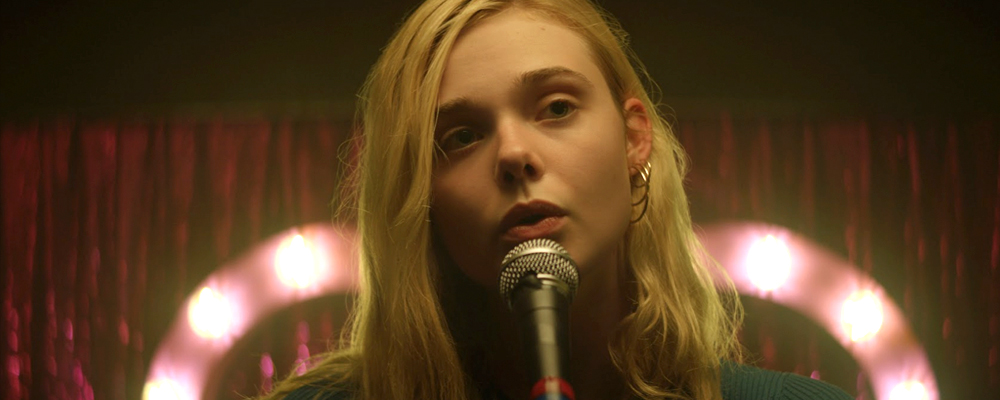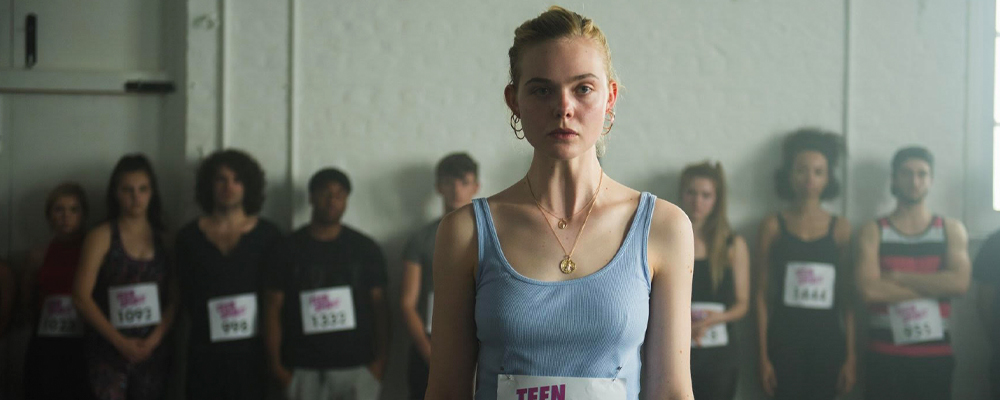Elle Fanning Chases Pop Dreams While Singing Her Heart out in ‘Teen Spirit’
Alci Rengifo
“Teen Spirit” features one of those characters we can’t help but root for. Shimmering with color and the beat of pop music, it’s a classic rags-to-riches story with the simple objective of making the audience smile. Elle Fanning is the highlight, proving she has the vocal range for the kind of bubblegum pop that croons lyrics like, “I’m in the corner, watching you kiss her.” This movie understands that a song can mean everything to someone, crystalizing what they feel.
Fanning plays Violet, a young Polish girl stuck in a small English town who lives in the world of her headphones, listening to pop hits while writing her own material. She’s also a waitress, but performs once in a while at a local night spot. When auditions for a TV competition show called Teen Spirit take place, she immediately feels like entering. It’s not such a good idea for her mother, Marla (Agnieszka Grochowska), who would rather her daughter focus on school a practical career. But Violet soon catches the ear of Vlad (Zlatko Buric), taken by many to just be another old drunk, but who reveals he was once a great opera singer. Vlad offers Violet to help train her for the competition, if she’ll agree that he be her manager. As Violet prepares to take a big leap in her life, she begins to face her own insecurities, the cutthroat world of the music business and the hopes of her hometown.
Nothing about the above description of “Teen Spirit” sounds unconventional. Yet that’s not a slight on the movie. True, it is not a visceral work of cultural criticism like last year’s underrated “Vox Lux,” but it doesn’t have to be. Making his major directorial debut is actor Max Minghella, who also wrote the screenplay. The story feels like a vehicle to work with a genre of music Minghella has a love for. He recently spoke with Entertainment Voice about the film’s journey. “The idea came from the song ‘Dancing on My Own,’ I really love that song, because of its tone, including this melancholic European thing it has. I wrote a sequence to it, and it all came from there,” shared Minghella. Indeed the film feels completely driven by the songs on its roster, from hits like “Just a Girl” by No Doubt to the song by Robyn which inspired Minghella. Fanning sings all the songs crooned by Violet, showing off a pitch-perfect range for such material. “I knew that she could sing, I knew that she could dance, and all of these things, but I was still hesitant in theory because she’s American, and I didn’t know how an American could play a Polish immigrant. But the moment I sat down with her I knew she could play the part. There’s actually a tremendous amount of Violet in her, and people that know her understand that as opposed to people that don’t know her,” said Minghella. Fanning does manage to avoid the stereotype of the gifted or underappreciated musical genius, instead she plays Violet like a person who has a gift but is stunted by life’s unforgivable circumstances. She is shy when she should be daring, she struggles to look up while auditioning onstage. Her tone is actually subdued. It’s when she sings that she comes alive. “There’s a lot of her soul in this person.”
Visually “Teen Spirit” channels the look of pop music video aesthetic. Cinematographer Autumn Durald contrasts the drab look of Violet’s wet neighborhood with the blinding lights and colors of nightclubs and TV sets. This film is not meant to criticize the pop world, it wants to celebrate it. There are moments that feel recycled, but they also work because something about them always rings true. When Violet auditions for the show and the judges are draped in shadow, coldly commenting on her lacking technique, you sense this is how it actually happens. When Violet faces the temptation to party during the competition, it’s not so much another slam on the excesses of the music world as a look at how teen angst and riskiness is pushed up another notch by what success offers. Minghella studied films like the 1991 Madonna documentary “Truth or Dare” to get a sense of the cross between an artist’s intimate self and the grandiosity of putting on a show. “It’s beautifully made. There’s also a Katy Perry documentary, ‘Part of Me,’ that’s beautifully made.”
A good anchor that keeps the story engaging is the character of Vlad, who fills the role of Violet’s conscience and need for wise counsel. Zlatko Buric plays the role with the rotund presence of a man who once tasted glory, and today only tastes the bottom of a liquor bottle. But he’s that sort of teacher people need when other supposed role models are failing them. He gets it together to show Violet voice technique and the proper stage attitude. Sure it’s corny, but with actors of this caliber they can make it enjoyably entertaining.
But let’s be frank, the true appeal of the film is watching Fanning grace the stage, delivering her own renditions of “Dancing on My Own,” “Lights” and “Wildflowers.” She becomes a conduit for everyone who feels these songs in their bones. We root for Violet as she tries to win her moment in the spotlight because she’s also bringing out everything big fans of this music genre take seriously about these lyrics and sounds. Awash in color, “Teen Spirit” is escapism with heart. “I’m proud that this movie doesn’t tell you how to feel about these characters,” said Minghella. “It was important to me that everybody was operating from a place of authenticity. That’s rare in American films where everyone is either a baddie or a goodie. If the pop music and the story can get new audiences to look at films in a different way, I think that would be a wonderful achievement.”
“Teen Spirit” opens April 12 in select theaters and expands April 19 nationwide.





